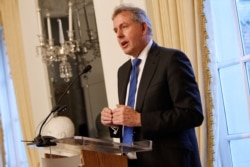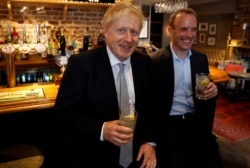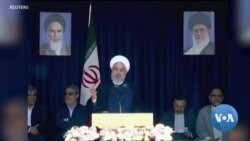British Foreign Secretary Jeremy Hunt said Monday that the international deal on Iran’s nuclear program “isn’t dead yet,” and that while the opportunity to find a resolution to the current crisis surrounding the agreement is closing, it is still possible to keep it alive.
He spoke ahead of talks with other European Union foreign ministers in Brussels where they planned to discuss the Iran situation.
The 2015 Joint Comprehensive Plan of Action was agreed to by Iran and a group of world powers that included Britain, China, France, Germany, Russia and the United States to allay concerns Iran was working to develop a nuclear weapon.
Iran has long said its nuclear program was solely for peaceful purposes, and it won badly needed relief from sanctions in return for limiting its nuclear activity far below what would be needed to make a weapon.
Hunt said Monday that Iran was more than a year away from having the capability to build a nuclear device.
'Diplomatic vandalism'
The comments came a day after the publication of cables from former British ambassador to the U.S. Kim Darroch who was critical of U.S. President Donald Trump’s decision to withdraw from the nuclear deal last year.
In a May 2018 cable, Darroch wrote that the Trump administration, in abrogating the Iran deal last year, “is set upon an act of diplomatic vandalism, seemingly for ideological and personality reasons — it was Obama’s deal.”
The Mail on Sunday published Darroch’s message back to London, days after he resigned and a week after the newspaper published other leaked cables. In the earlier memos, the diplomat described the U.S. leader as “inept,” “insecure” and “incompetent” and his administration as “uniquely dysfunctional.”
Darroch resigned from his post Wednesday, saying his three-year posting in Washington had become untenable with the disclosure of his cables.
The leaked cables were meant to be seen only by senior British ministers and civil servants. British officials launched an investigation of the leaks but did not deny the accuracy of Darroch’s comments, expressing the opinion that the person likely responsible for the leak was someone inside the British government, not a foreign power.
The Sunday Times reported that investigators have identified a civil servant as the individual who leaked the cables.
Boris Johnson, a Conservative favorite to succeed Theresa May when she steps down as prime minister later this month, seemed to dismiss the importance of the leaked cables.
He described them as “embarrassing but it is not a threat to national security.”
“It is the duty of media organizations to bring new and interesting facts into the public domain,” said Johnson, himself a journalist and former editor.
In May 2018, Johnson, then Britain’s foreign minister, went to Washington to try to persuade Trump to not abandon the Iran pact.
After British and U.S. officials met, Darroch reported back to London that there were divisions within the Trump administration over Trump’s intention to quit the Iran accord. The diplomat criticized the White House for a lack of long-term strategy to deal with Iran.
“They can’t articulate any ‘day-after’ strategy; and contacts with State Department this morning suggest no sort of plan for reaching out to partners and allies, whether in Europe or the region,” he wrote.
Trump has long attacked the 2015 international Iran nuclear deal aimed at restraining Tehran’s nuclear weapons development as ineffective and repeatedly blamed Obama and former Secretary of State John Kerry for pushing for its adoption.
Trump withdrew the United States from the deal last year and reimposed economic sanctions, hobbling the Iranian economy and limiting its international oil trade.
Five other countries — China, Russia, Germany, France and Britain — along with the European Union have remained in the accord, but voiced their displeasure as Tehran has exceeded the size of the uranium stockpile and the uranium enrichment level allowed under the pact.









